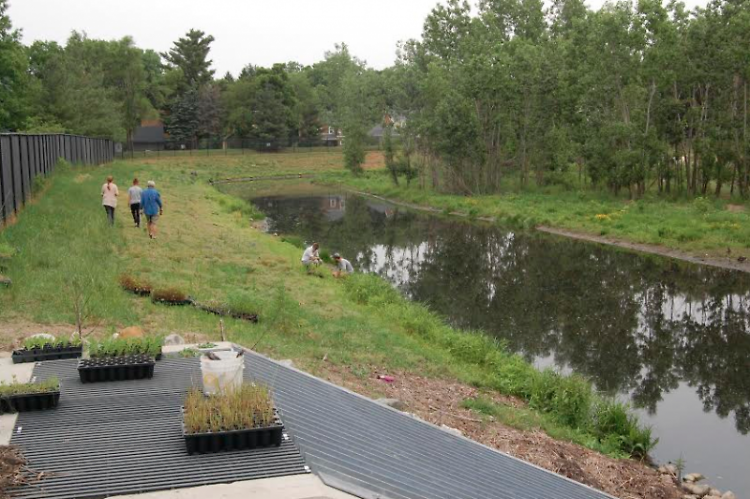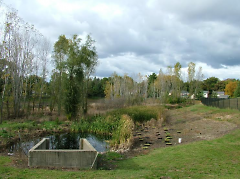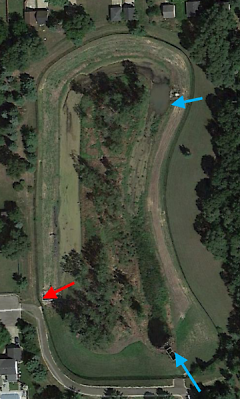Written by Mike Ryskamp
If you’re driving down Plymouth Street on the right day, you might see 94 sixth graders marching down the sidewalk with shovels, loppers and other landscaping paraphernalia in tow. Do not be alarmed: the students are on their way to class.
This school year, the sixth graders at Grand Rapids Christian Middle School have adopted Kreiser Pond, a retention basin managed by the office of Kent County Drain Commissioner Bill Byl. The three acre basin has recently undergone a large retrofit to expand its capacity for capturing and treating the stormwater flowing in from the surrounding area- some 300 acres of suburban neighborhood.
The makeover began in 2011, when the Drain Commission Office excavated a long, horseshoe-shaped channel within the previously underutilized acreage. This long channel greatly expanded the volume of stormwater that can flow into the basin before it flows out. On stage two of the project, the Drain Commissioner partnered with Plaster Creek Stewards, who worked with an army of volunteers to establish native wetland and prairie habitats in the basin over the course of two summers.
These native Michigan habitats, as the sixth graders are learning, perform important ecological functions and services. The native plants that form the foundation of these habitats support high levels of biodiversity, much higher than that of mowed turf grass and ornamental landscaping. During the spring and summer months the pond is bustling with breeding songbirds, honking waterfowl and fluttering Monarch butterflies.
Other ecological services have more tangible economic benefits for the people of Grand Rapids. The massive root systems of the prairie grasses can reach well over 10 feet deep, soaking up large volumes of stormwater while creating an active, spongy soil layer that filters pollutants and captures stormwater before it flows downstream. Less stormwater downstream means less pollution, less flooding, less erosion and healthier Grand Rapids communities.
Sixth grade teacher Gary Warners was first introduced to Kreiser Pond while working with Plaster Creek Stewards as a supervisor for their Green Team, a summer work crew of high schoolers that live in the Plaster Creek Watershed and have an interest in environmental work. Warners loved the summer work at Kreiser and saw the habitat restoration as an opportunity to get his sixth graders involved in some long-term place based learning.
So far this year, Warners and his fellow sixth grade teachers have been busy at Kreiser, planting thousands of native perennials and actively managing the aggressive weeds that sprout. They are even using the space for math and science lessons by having students calculate area, make maps and investigate aquatic macroinvertebrates (things like crayfish, dragonfly nymphs and other crawly creatures that could make a sixth grader scream in fear and/or delight).
“It causes great excitement when they know that a trip to Kreiser is coming,” says Warners. “The more often we visit, the more familiar the students become with the place. That familiarity is leading to a caretaker mentality that some students take very seriously. Kreiser Pond will be one of the long-lasting memories of our sixth grade.”
The sixth grade teachers have ambitious plans for more place-based learning at Kreiser Pond this school year. In addition to more planting and weeding, the sixth graders will be taking weekly observations from specific locations within Kreiser to monitor seasonal change.
The students’ excitement about their adopted pond is tangible. Occasionally, it can also be a bit noxious: after a field trip to Kreiser, one student apparently kept some old raccoon bones in his locker for five days.
An animal corpse in a middle-schooler’s locker? Nothing to worry about, just the sign of a young biologist-in-the-making with some excellent teachers.
The Rapidian, a program of the 501(c)3 nonprofit Community Media Center, relies on the community’s support to help cover the cost of training reporters and publishing content.
We need your help.
If each of our readers and content creators who values this community platform help support its creation and maintenance, The Rapidian can continue to educate and facilitate a conversation around issues for years to come.
Please support The Rapidian and make a contribution today.



